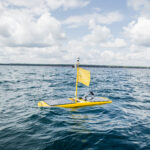Many people have questions about the historically low Great Lakes ice cover this winter, and we’ve got answers! NOAA GLERL’s Bryan Mroczka (Physical Scientist) and Andrea Vander Woude (Integrated Physical and Ecological Modeling and Forecasting Branch Chief) answer the following … Continue reading

February 22, 2024
by Gabrielle Farina
Comments Off on Q&A with NOAA scientists: Causes and impacts of 2024’s historically low Great Lakes ice cover


